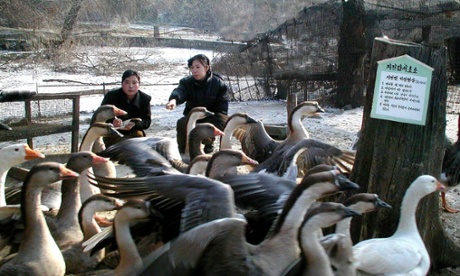
A researcher at North Korea’s Central Zoo has been busy working on a liver medicine to combat hepatitis, according to the state news agency KCNA.
Kwon O-song, a researcher at the zoo, said the new medicine consisted of “a compound of bear’s gall and extract from pith of maackia amurensis,” according to KCNA. He reportedly added that it “has proved to be efficacious against liver diseases like fatty liver and hepatitis.”
The article cites the case of Choe Ryong from the Pothonggang District of the North Korean capital Pyongyang, who “feels no pain in his right side and digests well after taking it for nearly half a month.” The medicine has been awarded the DPRK patent, the report said.
Robert Winstanley-Chesters, director of research at Sino NK, a group of academics focused on North Korea, says the ‘liver cure’ is not as weird or wonderful as some might think “but one quite closely connected to east Asian, Chinese and Korean traditional medicine.”
Bears gall and bile are regularly used in Chinese medicine so this should be seen as “quite an expected medical development so far as North Korea is concerned”, he says. Moreover, it is an example of “self sufficiency and the creation or development of medical practice and technique that is specifically North Korean,” he added.
Winstanley-Chesters points to an article in Rodong Sinmun, the state newspaper, which says that doctors were hoping to cure what they called obstinate diseases with the ‘Koryo Medical Method’. The method is never explained but the reference to Korean history asserts an “authentic Koreaness”, integral to any institution, development or technology coming out of North Korea, he says.
The maackia amurensis, also known as amur maackia, is a deciduous shrub common in east Asia, China and Korea. A Canadian guide to complementary health care says that whilst the bark is commonly used in Korean medicine, in the west “the tree is primarily considered ornamental and planted for erosion control.”
Bears are said to be resident at the Central Zoo, with four appearing in a promotional video in 2011. In the film, also put out by KCNA, Ju Kum-Chol – named as the head of the technical department – claims that animals enjoy “natural environments similar to their habitats.” However, the bears are shown prowling around a concrete bowl with a patchy piece of grass at the centre.
Hepatitis is the term used to describe the swelling of the liver as a result of a viral infection or exposure to harmful substances like alcohol. Fatty liver disease is also a symptom of alcohol abuse, and can affect people who are overweight or obese.
This is not the first medical advancement North Korea has announced. In July KCNA revealed a “nano gold injection” for “immunity invigoration, inflammation, pain, neurosis, cerebration and blood circulation, promotion of metabolism and effacement of active oxygen. It also removes poisoning by medicine or chemicals.”
Nano-gold, which is gold broken down in to tiny particles is popular among some followers of alternative medicine, often ingested in a tea or as a tonic, and researchers at a Norwegian University are currently testing whether injecting it in to the body could help to combat cancer or Alzheimer’s.
KCNA said, it was developed at the Nano Technology Institute at Kim Il-sung University, but, as with the case with the liver medicine, gave no details on when it would made commonly available.
In May 2014, KCNA also announced plans for a mushroom sports drink to enhance athletic prowess. “This natural drink is very effective in enhancing physical ability of sportspersons and recovering from their fatigues”, a news report said. No independent media outlets exist in North Korea to help verify information released by the state media organisation.
Analysts believe claims of medical advancement could be part of state attempts to deflect possible criticism of the general health care system, which is believed to be dire.
A series of Guardian interviews with North Korean defectors painted a bleak picture of healthcare: a crumbling system where people are said to be taking methamphetamine as drugs are too expensive to buy. But Winstanley-Chesters points out that “not all aspects of the North Korean health service will be as decrepit as is the popular or media conception”. Members of the party and army elite probably enjoy “very good health resources”, he says.

